- Home
- Dave Gross
Hell's Pawns Page 3
Hell's Pawns Read online
Page 3
"Here now, don't you bother them girls," says a woman I take to be the mistress of the kitchen. She must outweigh me by half, but it's all muscle and grit. She slides a clay mug of steaming tea across the table toward me. "They're dreamy enough without your encouragement."
While thinking of a way to break the ice with the tough old gal, I appraise the other servants. An under butler counts the silver while the maids responsible for it stand nearby, awaiting his verdict. A boy brings a yoke with two pails of water in for the woman I take to be the cook, and she points him to a scullery maid scrubbing what appears to be the last in a large collection of copper pots. Two more servants, a man and a woman, inspect bushels of produce and call out quantities to a one-armed man who checks off a tally with a drooping quill.
"What's a classy girl like Pavanna doing in a place like this?"
All of them are human, which tells me that the Henderthanes are a particular breed. Most noble houses employ at least a few halflings, knowing that they accept lower wages. Besides, for sweeping chimneys and other cramped jobs, you can't beat a slip.
Just before I can crack wise with the water boy, who looks a likely mark for gossip, I hear a woman's voice in the hall whisper, "What's he doing here?"
"Never you mind, Rusilla," says Niccolo. "Go check on your girls upstairs. Last week the guest rooms were in no state for visitors." Without turning my head, I peer over to see the majordomo turning away a woman in a maid's apron. She has a round, simple face with childlike eyes opened wide at the sight of me.
"But it's always a scandal with that one's master," she says.
Niccolo gives her a gentle push, but she is immovable.
"Go now, Rusilla dear," says a woman from behind her. I can't get a good look without giving away my attention, but with a sidelong glance I get the impression of sculpted cheekbones and hair wrapped tighter than a tourniquet.
Niccolo closes the kitchen door and draws the newcomer close into a whisper as Rusilla retreats. They face each other, so I look directly at them through the glass. The newcomer is a tall woman of severe beauty. In her iron-gray hair is pinned a nurse's bonnet.
Why has he come? says the woman. She has excellent diction, so it's easy to read her lips.
Niccolo shrugs and says something about the late Lord Henderthane and not knowing the details. I catch her name on his lips—Korva.
Then why aren't you still there? she says. I want to know every word.
He begins to protest but resigns with a sigh and marches back toward the den. Korva looks at me, and I meet her gaze as if only just seeing her. I try the little smile, but she gives me nothing back before turning on her heel and walking away.
"Such a fuss," says the cook. She brings the kettle over to give me a warm-up. "Why has your master come to Henderthane, hmm?"
"I was hoping you could tell me."
"Something about the late master's tryst, no doubt," says the man tallying carrots and cabbages. "The harlot must be blackmailing the young Lord."
"Who would believe the word of a hellspawn whore?" says the cook.
Sometimes the best way to get the servants talking is just to listen, but I feel their eyes on me, and I know my cues. Since the masters of Cheliax first conjured diabolic legions rather than surrender another rebel holding, no one is more loathed than us hellspawn. That doesn't stop the men of Egorian from visiting devil-blooded doxies, especially those with certain features not found on human women. I recite the common protest of men spotted leaving a hellspawn brothel: "Only a fool believes a Tall Tail."
After a moment's silence, the girl beside me stifles her laugh with the napkins she is meant to be folding, and then the cook guffaws. You can always bet the staff have heard of the city's most notorious hellspawn brothel.
"Asmodeus knows what pox she gave him," says the tally man.
"Enough of such talk," says the cook.
I file away this information and change the subject. "Mistress Henderthane looks familiar."
"Don't get any ideas," says the cook. She gives me a warning scowl before turning her back to review a list by the stove. I listen to the household gossip for a while, but none of it sounds useful.
My boredom must be obvious, because the giggling maid nudges me with her knee. I lift an eyebrow.
"You might have seen Mistress Pavanna at the Palace," she whispers. "She skips her calligraphy lessons to visit her mother."
"At the Palace?" I can't help sounding impressed, but then I realize the maid knows perfectly well I'd never been within a street of the Royal Palace. She means the "Palace" in Cheapside.
"Aye," she says, lowering her voice further. "Her impresario tried to get her a place back in the opera chorus, but after the misfortune, there wasn't a hope."
"I know who you mean," I say. I have no idea. "That impresario by the name of..."
"Pandarus the Pleaser, he fancies himself."
Before I can ask another question, Niccolo leans into the kitchen to crook a finger at me. Time's up.
When we return to the den, the boss is sketching a map of the Mwangi Expanse in the air. Morvus hangs on his description of intertribal relations while Orxines gradually moves toward the door in a bald effort to encourage Jeggare's departure. Pavanna looks at Jeggare and her brother with a curious expression on her face. Is she puzzled? Disappointed? I can't read her beneath all that lace and powder.
"You should lecture at the Academy," says Morvus. His voice is charged with enthusiasm. "No one there knows half as much about Mwangi culture as you've just told me."
"It is a hobby horse of mine," says Jeggare. His understatement is lost on everyone but me. He has already spent two human lifetimes on his various hobby horses. "It would be a pleasure to share what I have learned with your fellows."
"A splendid idea," says Orxines. "However, I am sure the Academy schedule is fixed for months to come."
"But Uncle," says Morvus, "schedules can be changed."
"Of course," says Orxines. I can tell from his tone he's saving his objections for after we leave.
Morvus says, "It was an honor to meet you, Count Jeggare."
The boss bows a little lower than before. "The honor was entirely mine, Lord Henderthane." More bows and courtesies, and soon Niccolo has us back out beside the carriage. The edge of the sun has fallen beneath the silhouettes of the western buildings as we drive past the gates. Once we're out of sight of the guards, the boss has the driver stop and beckons me inside.
"What did you learn?" he says. I tell him about Korva and Rusilla, the rumor about Einmarch's doxy, and Pavanna's visits to the Palace of Jubilations.
"Excellent," he says. "Unfortunately, I spent most of our interview deflecting questions about the identity of our employer."
"Pavanna looks a lot better out of all that foofaraw."
Jeggare looks at me.
"I meant in different clothes."
"I found her quite fetching as she was," he says. "Did you note the family resemblance to Morvus?"
"I was in there for only a couple of minutes." Most of that time, I confess to myself, I was looking at Pavanna, but since they have different mothers, it's no surprise she looks nothing like her brother.
The boss raps on the roof. When the driver opens his little window, Jeggare says, "To Ruby Street."
It isn't the worst place in Cheapside, but no one boasts of going to the Palace. I've been there a few times to talk to afternoon drunks as they gaze mournfully up the singers' skirts.
The driver parks near the Ruby Street entrance, over which a sign advertises the name of the establishment in garish colors: The Palace of Jubilations. Above that is a long faded line of dancing girls kicking up their skirts. Paint flecks snow down on us as I push through the saloon doors.
We pause a moment to let our eyes adjust to
the gloom. Red and green shades cover the lamps, casting carnival colors over the crowd. A couple dozen men slouch over their drinks, a few of them slurring the sad clichés of their lives to each other but most staring at the one bright point in the room.
On a little stage in the corner stands a woman in what might have been an opera gown before someone cut the front of the skirt up to her thighs. Green-white light shines up from the little wells surrounding the stage, and motes of lime drift around her feet. The merciless light emphasizes the failure of her heavy makeup to mask the years of disappointment on her face.
The sultry love song makes few demands on her voice, but I can tell she has a little talent. I can also tell it's only a little. Anyone who can really sing ends up in the opera chorus or in a legitimate playhouse.
"Drulia Henderthane," says the boss.
He filled me in on the way over. Einmarch Henderthane's second wife was a chorus girl in the Royal Opera. After the death of the first Lady Henderthane, Einmarch took a fancy to the ingénue, who was quick to believe his promises of making her the toast of Egorian. In thanks for the birth of his second child, Morvus, Einmarch used his political influence and no small weight of his fortune to persuade the masters of the Opera to elevate Drulia to principal soprano.
The rest of the story everyone in Egorian society knows. Woefully short of talent, Drulia gave a single performance before the mortified nobility. The peers were all very polite, but alehouses across the city crackled with mockery within moments of the closing curtain. All that remained was full retreat, and when the opera reopened two weeks later, it was without Drulia Henderthane. The marriage lasted slightly longer.
"Mrs. Henderthane doesn't seem overly dismayed by her husband's death."
A barmaid finds us before we find a table. I flash the little smile and hand her one of the boss's coins, whispering "Pandarus" in her ear. She points us to a table just big enough for two goblets of wine before disappearing through a drape behind the bar. Moments later, a rotund little man with tiny brush strokes for mustaches bustles out from the curtain. He snaps his fingers at the bartender and points to our table before joining us.
"Pandarus the Pleaser, my lords." He makes an obsequious bow before pulling up a third chair with a flourish. "How may I be of service?"
"The singer," says the boss. "We'd like to meet her."
Pandarus smiles, and I see two gold teeth in his mouth. From that point, it's just a question of haggling before he takes us backstage.
The girls at the Palace share a common dressing room, and they aren't girls, strictly speaking. Most are older than me, a few old enough to be my mother. When Drulia's set is finished, she returns to sit before a dressing table cluttered with jars of cosmetics and a carafe of wine with a single pewter goblet. Another woman leaves to take her place on stage while two others sit around staring at us. I put a couple of Jeggare's coins in their hands, and they get lost. I have to put twice as many into Pandarus's fat fingers before he stops hovering. As he departs, Drulia plucks a slim brown cigar from his breast pocket and holds it just above her shoulder. I take the hint and fetch a candle from her dressing table. She cups the flame and draws a light.
The boss skips the courtesies he displayed at the manor, which I figure is a good call. Drulia wasn't born a Henderthane.
"I am looking into your late husband's death," he says.
"Pavanna hired you." It's not a question.
The boss never gives up his clients. When Drulia looks at me, I shrug.
"No one loved him more than she did," she says. "I suppose no one else loved him at all."
"You do not seem surprised that we are investigating his death," says Jeggare.
Drulia takes a long drag off the cigar. "Nothing surprises me anymore."
"How did you hear of it?"
"Pavanna told me," she says. "It was the last time I saw her, just before the funeral."
"You did not attend?"
She sets the cigar on the edge of her dressing table and wets a cloth in a basin. "What do you think?" she says. She begins wiping the caked powder from her face.
"But what of your son?" asks Jeggare. "Didn't he need you?"
Drulia sets aside the washcloth to look at him. The kohl is smeared in a half-spiral around her eyes, but I see her son's features clearly in the proud tilt of her head. "Morvus never needed anything his father didn't give him."
"His Uncle Orxines was there to support him during this difficult time."
"Uncle?" She emits an anemic laugh and picks up her cigar. "‘Uncle' Orxines is headmaster of the Scions Academy. No doubt he wants to make sure Morvus doesn't withdraw his tuition during ‘this difficult time.' Morvus must decide how to spend his portion of the inheritance."
Jeggare considers her words and says, "Morvus is sole heir to the Henderthane estate."
Drulia almost drops her smoke. "There must be some mistake. Einmarch showed me his new will when he reduced my inheritance. Pavanna was to have a third of his holdings outside the city."
"But you also have heard nothing from his executor since Einmarch's death?"
"No," she says. "But that's no surprise. Einmarch kept sending me money after we separated, even though I told him I didn't want it. I supposed he figured I'd already had my share and wrote me out entirely."
"But not Pavanna."
"He doted on that girl. We all did. She was the one bright spot in the family, even after the embarrassment of my one-night stage career."
"What about Morvus, your own child?"
Drulia takes a long drink of wine. Then she smokes her cigar and stares at the dirty wall. I'm beginning to think she's done talking when she says, "It's the strangest thing, but I have never loved that boy, not from the moment I first held him. I know how that makes me sound. But to me he was always the thing Einmarch wanted, the thing he wanted me for. A son. Now his sole heir."
It's one of those turns in conversations that makes me tense for the kill, as Jeggare pounces at moments of weakness, striking with the question no one expects. It can be thrilling, if you have the stomach for it. He moves his chair to sit closer to Drulia, placing himself in her vacant eyeline. She looks up at him, and I see her lips tremble for an instant.
"I was present during the night of your performance at the opera," he says. I cringe in anticipation. "The role was entirely wrong for you, madame. You are no soprano."
Drulia straightens her back as if bracing for a mortal insult.
Jeggare places a hand on hers. "But as I left the opera that night, there was no doubt in my mind that you belonged on that stage, in another part, not one that had been forced upon you. I hope to see you upon it again one day."
As we leave the Palace, the boss steps into the red carriage and closes the door before leaning out of the window to hand me a pouch of coins. "Perhaps you can learn something of this Tall Tail rumor tonight."
I don't relish the thought of walking through Cheapside in the Jeggare livery, but before I can complain, the driver pulls away. I look around to see whether anyone I know has spied me in this costume, and across the street I see Old Maccabus leaning against the sidewalk rails in front of a pawnshop. Glancing up and down Ruby Street, I spot a couple of the big young scrappers Zandros sends out from his headquarters in the Goat Pen for the rough stuff. They whistle a signal to their unseen companions. They've thrown a net around the Palace, and around me.
Mac crooks his finger, and I weigh the advantage of a head start against that of knowing what he wants to say. With his halo of white hair and a perpetual squint, he looks more like a bookkeeper than an enforcer, but he's the one Zandros sends out for the quiet work. Sometimes that means a soft word in your ear. Other times it means something other than a word. I go lean against the railing beside him.
"I'd bet on you if you ran," he says. "Today and tomo
rrow, maybe all week. But not for long."
"What's got him so worked up?"
Mac puts his hands in his pockets and shrugs. "I'm not even supposed to be here, but I finished my rounds early and saw the boys headed this way. Figured they could use some adult supervision. Make sure no one got his arm broke."
I imagine the wounded Ursio screaming for my head, not that Zandros would usually do more than laugh at the dwarf's misfortune. Still, it's probably better that it's Mac who arrived to ride herd on the young toughs. Ursio would as soon have them kill me as bring me in.
"Figured you go in, show some respect, find out what the old goat wants." Mac looks me in the eye like an uncle giving advice. "No harm in listening."
He's made his point. I won't have a peaceful hour until I face Zandros, and I can't keep looking over my shoulder while investigating the death of Pavanna's father.
"All right?" says Mac. He pushes off from the rail with his hands still stuffed in his pockets.
It's pretty damned far from all right, but I grunt a reluctant affirmative. Together we walk west toward the waterfront, a wake of gangsters forming behind us.
Chapter Three: The Goat Pen
Walking down Eel Street toward the sunset, I notice again how much the silhouette of the Goat Pen resembles a monstrous crouching toad.
What was once a wheelhouse that raised the big cargo winches had been condemned after the collapse of the Eel Street Dock. Through one of his intermediaries, Zandros bought the stable as well as an adjoining smithy and salt house for a pittance. In the twenty-odd years since, he's tasked his henchmen with shoring up the sagging interiors, but they've done nothing to maintain the exterior. The outer surfaces are dotted with blue mold, and all the walls slump inward to give the place the appearance of a predator tensed to leap. The windows are boarded shut except on the smithy entrance, beside which hangs a scabrous painted board depicting a frothing mug atop an anvil.

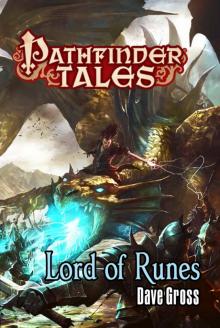 Pathfinder Tales- Lord of Runes
Pathfinder Tales- Lord of Runes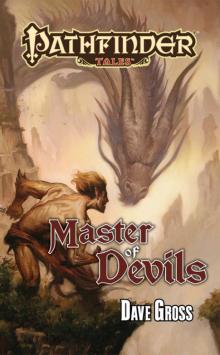 Master of Devils
Master of Devils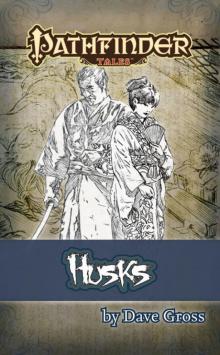 Husks
Husks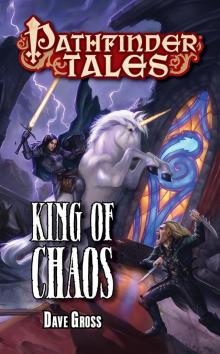 King of Chaos
King of Chaos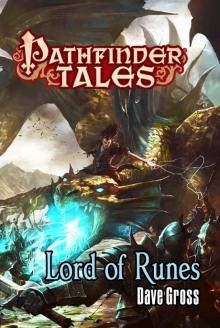 Pathfinder Tales: Lord of Runes
Pathfinder Tales: Lord of Runes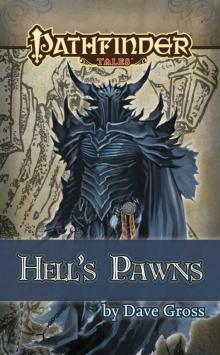 Hell's Pawns
Hell's Pawns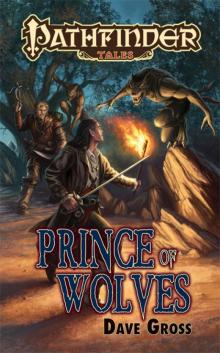 Prince of Wolves
Prince of Wolves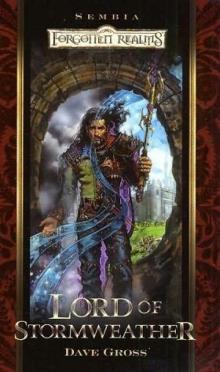 Lord of Stormweather fr-7
Lord of Stormweather fr-7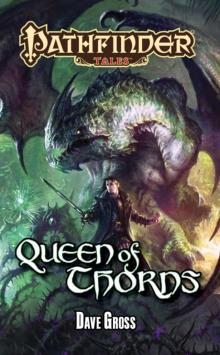 Queen of Thorns
Queen of Thorns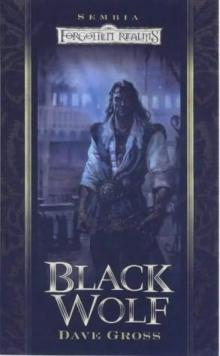 Black Wolf s-4
Black Wolf s-4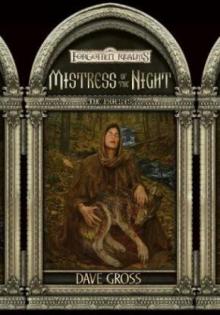 Mistress of the Night p-2
Mistress of the Night p-2